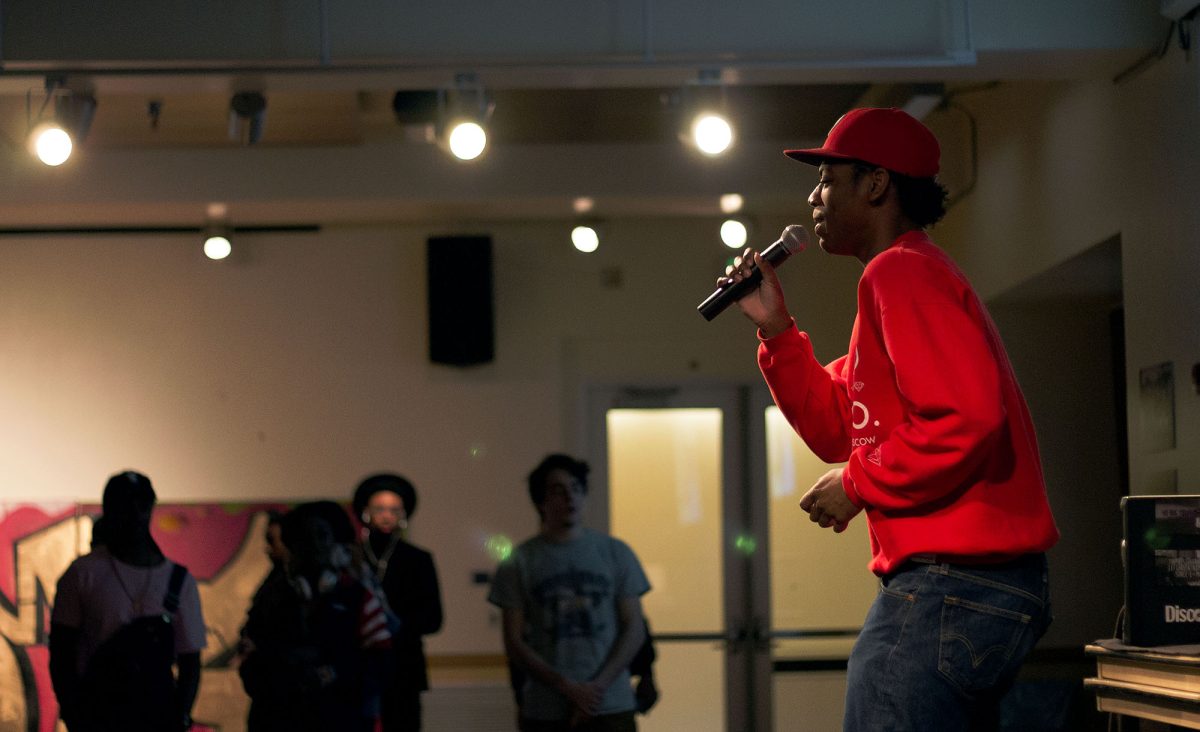Story by Maria Culp
Illustration by Cam Giblin
“If a doctor is on board, please report to the cockpit,” the flight attendant’s voice echoed throughout the plane. Clutching my lifeless hand, eyes closed, I tried to organize the traffic of thoughts rushing through my mind. I needed a doctor.
Just four hours earlier, on a different plane, a blaring, overhead voice jolted me awake. A long night of packing left me exhausted, and I was satisfied with the nap I managed to catch on the flight. The voice explained that we had just landed in New Jersey and I smiled unconsciously – I completed the first leg of my journey to Vienna, Austria. The “Fasten Seat Belt” sign flickered off with a startling “ding,” and I stood, slamming my head into the overheard compartment, to retrieve my baggage from above. This task, which I already viewed as a complete nuisance, was even more trying thanks to my useless right hand, which had fallen asleep during the course of my flight. With a little extra effort, I managed to make my way off the plane and onto a bench, which I claimed as mine for the next three hours – my last hours in America for an entire three months.
But after about an hour into my layover, as my hand continued to peacefully sleep, my hopes of relaxing slowly began to diminish. I’ve had limbs fall asleep before (who hasn’t?) but never for such a prolonged period of time. I recognized the familiar tingling and numbness, but I also knew that this is typically short-lived. On this day, as my mind raced and my worry intensified, my hand slept on.
In an effort to calm my nerves –– not the ones in my right hand (those were calm enough) –– I resorted to my favorite stress reliever, and one I highly recommend: food. Not overly enticed by any of the airport restaurants, I opted for a pre-made Caesar salad –– always a safe bet. But with my dominant hand out of the equation, I had given little thought to how I would actually enjoy my lunch.
Using my left hand, I broke into a small sweat as I wrestled the plastic wrap off my fork and haphazardly mixed in the dressing. Awkwardly gripping the fork, I pathetically stabbed bits of lettuce and chicken. My lack of coordination was causing a minor scene, and my frustrations were growing rapidly. Halfway through the salad, my desire to finish it had completely vanished.
Eventually, my layover ended and I boarded the Polish Airlines flight, navigating my way through the somewhat overcrowded aircraft. Finally, I found my seat––a cramped, torture-like device where I would be for the next nine hours. Lovely. A friendly-faced, plump Polish man squished next to me, and I closed my eyes hoping to fall asleep. After about an hour of restless, claustrophobic discomfort, I checked the status of my hand: still numb, still lifeless. Until this moment, I had been reasonably calm. But finally admitting that this could actually be serious, I felt the muscles in my face tighten and my heartbeat escalate.
My mind was a tangled mess of thoughts. This can’t be good. What if something needs to be done immediately? I needed a doctor.
Discreetly, I flagged over a flight attendant. But after explaining my predicament, I earned only an empty stare in return. She mumbled something in Polish, smiling kindly, and started to leave. Stopping her, I firmly said, “doctor.” With no response, she walked away leaving me completely bewildered. But seconds later, an announcement in about five different languages over the loudspeaker requested a doctor.
Concerned passengers nervously whispered, and as people began to realize that I was the poor soul at the crux of this drama, a small audience formed around me. Before I had time to brief my puzzled neighbor, he was literally yanked out of his seat and replaced by a young, handsome Polish physician.
“What wrong? Forgive me, my English not so good.”
I quickly updated him, and he frantically checked my vitals – my pulse, my neck, my eyes.
Seemingly baffled, he explained, “It not seem serious. Try move around, walk around, get blood moving, Okay?”
Wonderful. A doctor can’t even tell me what’s wrong.
After eight anxious, miserable hours, we finally touched down in Warsaw. Never in my life have I been so thrilled to get off a plane. With only an hour delay, I hurried through customs, desperate to call home.
I tried several pay phones, but grew increasingly irritated when they all rejected my credit card. Desperate for any help, I found a burly soldier, but quickly learned that he didn’t speak English. Genuine and eager, he asked, “Deutsch?”
Bingo! Years of learning German had finally paid off. He explained that I needed to purchase a calling card, and after another small struggle with the U.S. calling code (it’s 001, in case you are wondering), I waited: rrring … rrring … rrring. My mom answered. “Maria?”
No longer able to hold them in, tears flooded my face; there’s something about hearing your mom’s voice that just makes it OK to cry. Nearly fifteen hours had passed since my hand first fell asleep, and I had reached my limit. My screams wildly ricocheted off the airport walls. But through my tantrum, my mom somehow understood me, and advised me to see another doctor.
My last flight was short and painless –– a well earned change of pace –– and moments after arriving in Vienna, I was rushed to the Allgemeines Krankenhaus, the city’s general hospital. A young, male doctor called my name. After hours of worry, hours without a functioning hand, I was finally going to have answers. Following a brief examination, he explained in nearly perfect English, “You have nothing to worry about. This is actually quite common –– I see four or five cases a week. This is just the result of a severely pinched nerve. You’ll need to wear a splint for two to four weeks.” An overwhelming feeling of relief consumed me, and although I didn’t, I felt compelled to hug him. The damage wasn’t permanent, and I was going to be okay. I was going to be okay.
So, after the longest and most grueling travel experience of my life, I had arrived in Vienna with a temporarily paralyzed right hand. Key word: temporarily. Consistent with my luck, the two to four weeks of wearing a splint turned into a solid two months before my hand was fully functioning and had regained its feeling. But despite these unfavorable circumstances, the three months I explored Vienna and other parts of Europe were certainly not overshadowed. Not only did I leave Vienna with an appreciation of European culture, I returned to America with a newfound sense of exactly what I can handle.
Categories:
All Hands on Board
March 29, 2010
0
More to Discover















